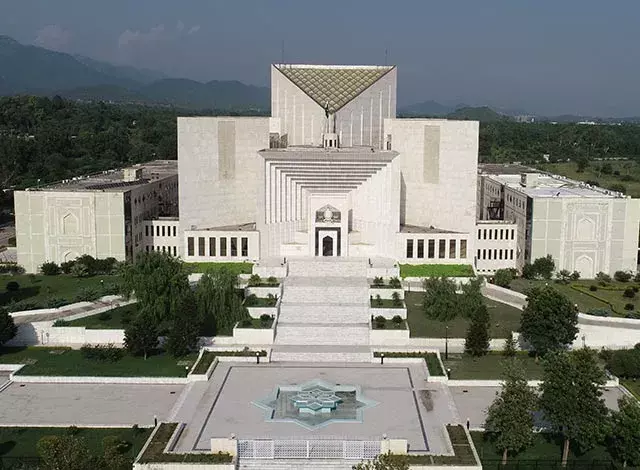Supreme Court of Pakistan

- The Supreme Court of Pakistan, located in Islamabad’s Red Zone, is the highest judicial authority in the country, serving as the final court of appeal for legal disputes and constitutional matters. Established under the Constitution of Pakistan, the Supreme Court ensures the rule of law, justice, and the protection of fundamental rights. The court has the power to review legislation, executive actions, and lower court decisions, making it one of the most influential institutions in Pakistan’s legal and political landscape. Its presence in the capital underscores the importance of an independent judiciary in upholding democracy and justice.
- The Supreme Court building, inaugurated in 1993, is an architectural masterpiece designed by Japanese architect Kenzo Tange. The structure features modern design elements with traditional Islamic influences, including white marble facades, grand columns, and an imposing dome. The interior of the building houses courtrooms, judges’ chambers, legal libraries, and administrative offices, all designed to support the smooth functioning of the country’s top judicial body. The main courtroom, where significant cases are heard, is known for its solemn and dignified atmosphere, reflecting the importance of the legal proceedings held within its walls.
- The role of the Supreme Court extends beyond just legal judgments—it also plays a crucial role in constitutional interpretation, election disputes, and human rights cases. Over the years, the court has made landmark rulings that have shaped Pakistan’s political, economic, and social landscape. It has taken suo motu actions on matters of national importance, such as corruption cases, environmental protection, and fundamental rights violations. The court operates independently, ensuring that justice prevails over political or external influences. The Chief Justice of Pakistan, along with other justices, holds the responsibility of ensuring that the country’s laws align with the Constitution.
- Due to high security, access to the Supreme Court is restricted to lawyers, litigants, and authorized personnel, but the building can be admired from Constitution Avenue, where it stands alongside the Parliament House and the Prime Minister’s Office. Occasionally, law students, legal professionals, and researchers are granted special permission to observe court proceedings and understand the judicial process. The Supreme Court of Pakistan remains a pillar of justice and democracy, ensuring the protection of rights, enforcement of laws, and accountability in the country’s governance.
